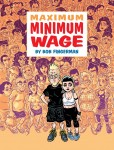
The use of free labor by for-profit companies has become a hot issue in recent years. Internships have become a particularly touchy topic – class action lawsuits by former interns have prompted some companies to end their unpaid internship programs, although there are at least a couple high-profile cases on appeal in which companies are challenging the Department of Labor’s standards for determining whether an intern is actually an employee.
Given how costly it can be for a company to fall afoul of federal law on this issue, it is indeed prudent for the companies that run comic conventions to assess whether it is legal for them to use unpaid volunteers. This is especially conventions run by for-profit companies, since charitable nonprofits enjoy a special exemption from minimum wage and overtime requirements in regard to volunteers. The Mary Sue has once again performed a service to the community in calling attention to this important issue.
With that in mind, in making this analysis it’s important to be aware of both the law’s requirements, the specific practices of each company, and the exemptions that are available outside the one given to charities.
First, since conventions produced by ReedPop — NYCC, ECCC, C2E2 — were mentioned in the post, it’s worth noting, as several “volunteers” have stated in the original comments thread and a related Reddit thread, that ReedPop pays volunteers minimum wage as official crew. Calling people volunteers in this context is a great way to foster a sense of community and community — one of things for which Lance Fensterman and company are to be commended is the way that they have fostered this communal sensibility while maximizing return on investment.
But not every for-profit comic-con that brings on volunteers gives these workers compensation – in fact, depending on the convention, you might actually be required to pay a fee for the privilege of helping the company out! Although this may seem on its face like a violation of federal law, there’s a legal loophole that has enabled countless commercial businesses to use volunteers in the standard sense of term.
Over the years the federal Fair Labor Standards Act has accumulated dozens of exemptions for a wide range of ventures, from homemakers making wreaths to C-level executives. For a company that operates a program taking place within a limited period of time during the year, there is one exemption in particular that catches the corporate attorney’s eye: minimum wage and overtime requirements do not apply to “any employee employed by an establishment which is an amusement or recreational establishment…” that operates no more than seven months a year or meets a financial test as to revenue generated at different times of the year. (29 USC 213(a)(3))
There are several cases that show how a commercial comic-con can take advantage of this provision, but the ruling perhaps most on-point was issued just a year ago in the Southern District of New York – coincidentally, the same federal district in which the New York Comic-Con takes place. Chen v. Major League Baseball Properties was brought by a former volunteer for the 2013 All-Star Week FanFest at the Javits Center (!), and the volunteer made arguments similar to those made in the intern lawsuits: volunteers at the event met the criteria for employee status, and thus Major League Baseball should have paid them at least minimum wage.
Major League Baseball — and the court — disagreed. As the court observed, although Major League Baseball operates all year long, Department of Labor regulations distinguish an entire enterprise from an “establishment,” which specifically refers to “a distinct place of business.” The exemption was put in place to accommodate seasonal ventures employing people for discrete periods of time in activities that might offer “non-monetary rewards.” The court concluded Major League Baseball’s FanFest was analogous to the amusement and recreational activities in view when legislators originally enacted the exemption, and the plaintiff’s federal as well as state law claims were summarily dismissed.
The plaintiff has appealed the district court’s ruling – in fact, it was argued in the Second Circuit U.S. Court of Appeals today, March 30 – but as noted above, there are a number of cases in other circuits that have reached similar conclusions. What’s more, even if the appeal succeeds, the main case being cited in opposition focuses on aspects of one baseball team’s operations that are distinguishable from a comic-con. For instance, while the team in question utilized its stadium for events throughout much of the year, comic-cons typically take place in rented facilities for discrete periods of time.
The analysis gets somewhat trickier for an entity operating multiple conventions. For instance, let’s assume that Wizard World doesn’t pay its volunteers — there’s nothing about compensation in the volunteer information packet, at least; Wizard World volunteers don’t even get munchies or parking reimbursements. The fact that Wizard World operates year-round could be grounds for arguing that the seasonal establishment exemption doesn’t apply, but there are also clever counter-arguments and organizational strategies that could persuade a court to disagree. Others have tried and succeeded with even more daunting facts – which, on a related front, is why the NCAA doesn’t have to pay taxes on ads sold for March Madness.
The seasonal exemption has long been a lifeline for companies offering an opportunity to volunteer for ventures that operate on a limited-term basis, such as amusement parks, outdoor swimming pools, Oprah’s Life You Want Tour, and New York Fashion Week. If you are an unpaid commercial comic-con volunteer who believes a lawsuit for back wages would be a clear home run, expect Major League Baseball Properties and cases like it to be deployed to strike you out.







Comments are closed.